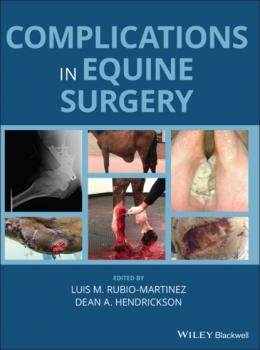Биология
Различные книги в жанре БиологияComplications in Equine Surgery
A groundbreaking reference on complications associated with equine surgical procedures Complications in Equine Surgery is the first reference to focus exclusively on understanding, preventing, recognizing, managing, and prognosing, technical and post-procedural complications in equine surgery. Edited by two noted experts on the topic, the book presents evidence-based information using a clear approach, organized by body system. Featuring color images, the book contains detailed coverage of the gastrointestinal, respiratory, musculoskeletal, urogenital, and neurological systems. Each chapter contains a short introduction of the procedure with explanations of when and how the procedure is to be performed. All chapters review how to recognize and prevent technical complications and explain how to manage post-operative complications. This important text: Offers the first resource specifically focused on complications encountered in equine surgery Takes a helpful format organized by body system Provides consistently formatted chapters for ease of use Covers clinically relevant information for dealing with technical and post-operative complications Presents more than 350 color images to illustrate the concepts described Written for general practitioners and specialists, Complications in Equine Surgery is an essential resource to decreasing morbidity and mortality and increasing surgical success in horses.
The Science of Health Disparities Research
Integrates the various disciplines of the science of health disparities in one comprehensive volume The Science of Health Disparities Research is an indispensable source of up-to-date information on clinical and translational health disparities science. Building upon the advances in health disparities research over the past decade, this authoritative volume informs policies and practices addressing the diseases, disorders, and gaps in health outcomes that are more prevalent in minority populations and socially disadvantaged communities. Contributions by recognized scholars and leaders in the field—featuring contemporary research, conceptual models, and a broad range of scientific perspectives—provide an interdisciplinary approach to reducing inequalities in population health, encouraging community engagement in the research process, and promoting social justice. In-depth chapters help readers better understand the specifics of minority health and health disparities while demonstrating the importance of advancing theory, refining measurement, improving investigative methods, and diversifying scientific research. In 26 chapters, the book examines topics including the etiology of health disparities research, the determinants of population health, research ethics, and research in African American, Asians, Latino, American Indian, and other vulnerable populations. Providing a unified framework on the principles and applications of the science of health disparities research, this important volume: Defines the field of health disparities science and suggests new directions in scholarship and research Explains basic definitions, principles, and concepts for identifying, understanding and addressing health disparities Provides guidance on both conducting health disparities research and translating the results Examines how social, historical and contemporary injustices may influence the health of racial and ethnic minorities Illustrates the increasing national and global importance of addressing health disparities Discusses population health training, capacity-building, and the transdisciplinary tools needed to advance health equity A significant contribution to the field, The Science of Health Disparities Research is an essential resource for students and basic and clinical researchers in genetics, population genetics, and public health, health care policymakers, and epidemiologists, medical students, and clinicians, particularly those working with minority, vulnerable, or underserved populations.
Fieldwork Ready
Discover how to plan, conduct, and interpret field research with this essential new guidebook Good field research is the driving force behind advancement in the agronomic, environmental, and soil sciences. Nevertheless, many undergraduate and graduate scientists have limited opportunity to develop hands-on experience before undertaking projects in the field. With Fieldwork Ready , Dr Sara Vero maps out the fundamental principles, methods, and management techniques that underpin this crucial practice, offering trainee researchers an accessible introduction to the world of on-site investigation. This instructive text includes: Guidance on the essential aspects of environmental monitoring and soil, water, plant, and wildlife research Insights into the methods behind experiment planning and effective fieldwork Tips for team management and safety Explanations of how to select and correctly use soil sampling equipment Offering new researchers a primer that is practical and easy to follow, Fieldwork Ready is the ideal starting point for all those beginning a career in the agricultural sciences.
Расширенный фенотип: длинная рука гена
Ричард Докинз – крупный британский биолог, автор теории мемов. Его блестящие книги сыграли огромную роль в возрождении интереса к научно – популярной литературе. Ясность изложения, юмор и железная логика делают даже строго научные труды Докинза доступными широкому кругу читателей. «Расширенный фенотип» развивает идеи его знаменитой книги «Эгоистичный ген» (1976), где эволюция и естественный отбор рассматриваются с точки зрения конкуренции генов. Эти идеи, вызвавшие бурную полемику, уже прочно вошли в научный обиход, а «Расширенный фенотип» по праву считается одной из важнейших книг в современной эволюционной биологии. © Richard Dawkins, 1982, 1999 Afterword © D.Dennett, 1999 © А. Гопко, перевод на русский язык, 2010 © А. Бондаренко, оформление, 2010 © Издательство «CORPUS» © & ℗ ООО «Издательство АСТ», «Аудиокнига», 2021
Vor und nach der Jägerprüfung - Teilausgabe Wildkunde & Wildkrankheiten
Diese Teilauflage von "Vor und nach der Jägerprüfung" umfasst die Teilbereiche Wildkunde & Wildkrankheiten.









